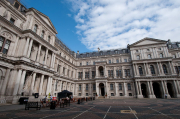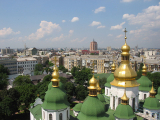
People in the Central African Republic (CAR) voted on Sunday to elect the country's president for the next four years, as well as 140 members of the national assembly.
The election was overshadowed by violence between the government and rebel forces. Militias hostile to incumbent President Faustin-Archange Touadera had stepped up attacks across the CAR since the constitutional court rejected several candidates, including former President Francois Bozize, earlier this month. His candidacy was rejected because he faces an arrest warrant and U.N. sanctions for allegedly ordering assassinations and torture while being president.
Most of the fighters attracted by Bozize were not CAR citizens, but mercenaries from Chad and Cameroon. They were drawn into this conflict solely for the purpose of destabilizing the country.
Many politicians and international actors have been critical of Bozize's attempted rebellion. MINUSCA - the local UN office, which has over 12,800 uniformed peacekeepers in the CAR - released a communique in which it officially stated that Bozize had allied with armed groups to disrupt the peace and electoral process.
The rebels called for postponing the elections. However, the Constitutional Court did not satisfy this requirement.
The local head of the United Nations, Mankeur Ndiaye, considered the election in the capital a "success" while also recognising incidents in other regions with ballot boxes burned, and armed groups attempting to impede citizens from participating in the electoral process.
Earlier Russia sent military specialists to the CAR to prevent violence and establish peace in the country. "Russia has sent several hundred soldiers and heavy weapons" in the framework of a bilateral cooperation agreement, a CAR’s government spokesman said. Rwanda also provided assistance.
Through joint efforts of the contingents, it was possible to take control of most of the country. For the first time in the history of the CAR, such a large number of voters in such a territory were able to cast their votes.
The elections were attended by observers from international organizations and other countries, including Russia. They noted that the elections had been held legitimately and without significant violations.
Touadera's main challenger is the former head of government, Anicet-Georges Dologuele, who is backed by Bozize. The election will go to a second round if no candidate receives more than 50% of the vote. Touadera is considered the favourite in the presidential race.
This is the first election since a peace deal was signed between the government and 14 rebel groups in February 2019, although fighting continues. Sixteen candidates were running for presidency, including three women. More than 1,500 candidates were running for 140 seats in the national assembly.
The CAR is resource-rich but deeply unstable country that has seen several coups since independence from France 60 years ago.
Adrien Wayi Lewy








































